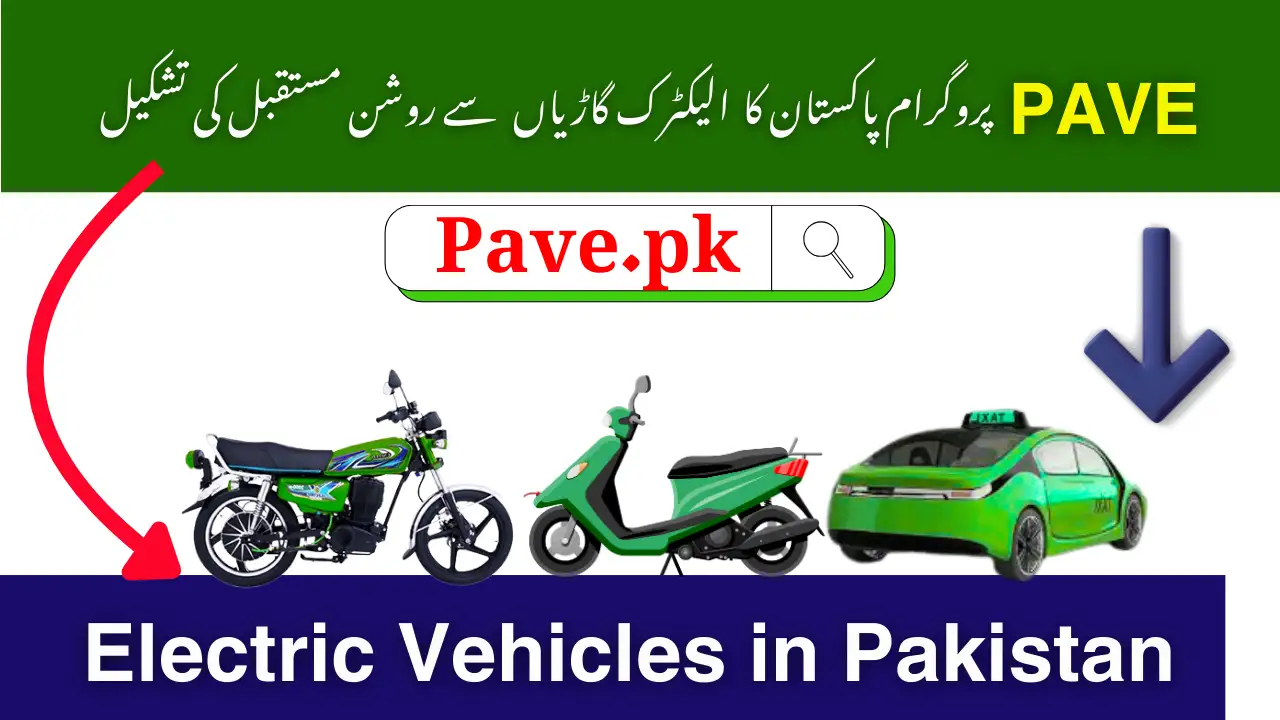Electric Vehicles in Pakistan: The Future of Transportation – PAVE Program

The transition to electric vehicles in Pakistan is no longer a distant dream, but an imminent reality. With the world increasingly prioritizing sustainable and eco-friendly solutions, Pakistan stands at the crossroads of a revolutionary change in its transportation sector. As urban air quality deteriorates, energy consumption escalates, and fuel dependency continues to strain the economy, the need for cleaner, greener alternatives has never been more urgent.
In response, the PAVE Program (Pakistan Accelerated Vehicle Electrification Program) is spearheading the adoption of electric vehicles, setting the stage for a future where Pakistan’s roads are powered by clean energy, reducing carbon emissions and contributing to a healthier environment.
What Are Electric Vehicles?
Electric vehicles are vehicles powered by electric motors, which use electricity stored in batteries rather than relying on internal combustion engines powered by fossil fuels. These vehicles offer a cleaner, greener alternative to conventional vehicles, producing no tailpipe emissions and significantly reducing air pollution.
EVs are not a single category but include various types of vehicles, including Battery Electric Vehicles (BEVs), Plug-in Hybrid Electric Vehicles (PHEVs), and Hybrid Electric Vehicles (HEVs). Each type offers unique benefits in terms of energy efficiency and environmental impact.
The widespread adoption of electric vehicles is essential for reducing dependence on fossil fuels, lowering greenhouse gas emissions, and promoting a cleaner environment. In addition to environmental benefits, EVs offer economic advantages, such as lower operating costs and reduced maintenance requirements compared to traditional vehicles.
Why Electric Vehicles in Pakistan?
Pakistan faces some of the most challenging environmental conditions, including rapid urbanization, increasing pollution levels, and an over-reliance on imported oil. The country’s transport sector is a major contributor to carbon emissions, with millions of vehicles emitting harmful gases that degrade air quality and contribute to health issues.
This growing pollution problem calls for urgent intervention, and electric vehicles in Pakistan offer a powerful solution. EVs have the potential to reduce air pollution, lower carbon emissions, and improve the quality of life in urban centers like Lahore, Karachi, and Islamabad. Furthermore, they can help reduce Pakistan’s dependence on imported fuel, thereby contributing to national energy security and economic stability.
By adopting electric vehicles, Pakistan can not only mitigate the impact of transportation on the environment but also create a sustainable and affordable alternative to the country’s current transportation system.
Read also: Pak Zon Electric Bikes
The PAVE Program: Revolutionizing Pakistan’s Transport Sector
The PAVE Program is a government-backed initiative aimed at accelerating the adoption of electric vehicles in Pakistan. By offering a range of incentives, subsidies, and tax exemptions, the program is making electric vehicles more affordable and accessible to Pakistani consumers and businesses.
The PAVE Program is designed to address both consumer and industry needs, focusing on reducing the financial barriers to electric vehicle ownership and developing the necessary infrastructure to support their widespread use. It also aims to promote local manufacturing and innovation in the electric vehicle sector.
Key features of the PAVE Program include:
- Financial Subsidies: Consumers are eligible for substantial subsidies on electric cars, rickshaws, and motorcycles, making them more affordable compared to conventional vehicles. The program also offers tax exemptions on the import of electric vehicles and related parts.
- Support for Local Manufacturing: The PAVE Program incentivizes local manufacturers to produce electric vehicles by offering tax breaks and reduced import duties on key components, helping to drive down the cost of EVs.
- Infrastructure Development: A major hurdle in the adoption of electric vehicles is the lack of charging infrastructure. The PAVE Program is working to build a network of EV charging stations across Pakistan, making it easier for consumers to charge their vehicles and improve the overall viability of EVs.
- Job Creation: As the electric vehicle industry grows, it is expected to generate thousands of jobs in manufacturing, sales, maintenance, and infrastructure development, stimulating the economy and providing employment opportunities.
Environmental and Economic Benefits of Electric Vehicles
The shift to electric vehicles in Pakistan is about more than just technology; it is about ensuring a cleaner, healthier, and more sustainable future for the country. The benefits of EVs are far-reaching and will have a positive impact on both the environment and the economy.
Environmental Benefits
- Reduced Carbon Emissions: One of the most significant advantages of electric vehicles is their ability to reduce carbon emissions. By switching to EVs, Pakistan can significantly cut down its overall carbon footprint, helping to combat climate change and meet international environmental targets.
- Improved Air Quality: In major cities, air pollution is a major concern, contributing to respiratory problems and other health issues. Since electric vehicles produce zero tailpipe emissions, they can play a critical role in improving urban air quality, making cities more livable and healthier.
- Lower Noise Pollution: Electric vehicles operate much more quietly than traditional gasoline-powered vehicles, which helps to reduce noise pollution, particularly in busy urban areas.
Economic Benefits
- Energy Independence: Pakistan is heavily reliant on imported oil to fuel its transportation sector, which drains valuable foreign exchange. By adopting electric vehicles, Pakistan can reduce its dependence on imported oil and enhance its energy security by using domestically produced electricity.
- Cost Savings: While the initial cost of electric vehicles may be higher than conventional vehicles, EVs offer significant savings in the long run. They have lower operating costs due to cheaper electricity and fewer maintenance requirements, which makes them a cost-effective option over time.
- Local Industry Growth: The growth of the electric vehicle market in Pakistan has the potential to boost local manufacturing and create new opportunities for innovation. By encouraging local production of EVs and components, Pakistan can strengthen its automotive sector and reduce reliance on foreign imports.
Challenges to the Widespread Adoption of Electric Vehicles
Despite the many advantages of electric vehicles, several challenges must be addressed for the successful implementation of the PAVE Program in Pakistan.
- High Initial Costs: The cost of electric vehicles, particularly the battery technology, remains a major barrier to widespread adoption. However, with the ongoing support of the PAVE Program and advancements in battery technology, the price of EVs is expected to fall over time.
- Limited Charging Infrastructure: Although the PAVE Program is working to expand charging infrastructure, the current network of charging stations in Pakistan is insufficient. Building a comprehensive network of fast-charging stations across the country will be crucial to the success of the EV market.
- Range Anxiety: Concerns about the range of electric vehicles and the fear of running out of battery power are still prevalent among potential consumers. However, as battery technology improves, the driving range of EVs is steadily increasing, making them a more practical option for long-distance travel.
- Lack of Awareness: Many consumers in Pakistan are still unfamiliar with the benefits of electric vehicles. Public education campaigns and awareness programs are essential to help consumers understand the advantages of EVs and encourage them to make the switch.
Read Also: Pak Zon PE 100L SE
The Future of Electric Vehicles in Pakistan
The future of electric vehicles in Pakistan looks promising, thanks to the support of the PAVE Program and the growing interest in clean energy solutions. As the program continues to incentivize the adoption of EVs, the demand for electric vehicles is expected to rise, driving down costs and making them more accessible to a broader segment of the population.
With improvements in battery technology, the expansion of charging infrastructure, and the creation of a supportive policy environment, Pakistan is on track to become a leader in the electric vehicle market in the region.
FAQs
1. What is the PAVE Program?
The PAVE Program is Pakistan’s strategic initiative to revolutionize the transportation landscape by accelerating the adoption of electric vehicles. Offering substantial subsidies, tax relief, and infrastructure enhancement, it makes EVs not only accessible but also an appealing choice for the future.
2. Why are electric vehicles crucial for Pakistan?
Electric vehicles in Pakistan are essential for reducing harmful emissions, curbing pollution, and achieving energy independence. They represent a sustainable alternative that aligns with global environmental goals, ensuring a healthier and more resilient future.
3. How does PAVE make EVs more affordable?
The PAVE Program significantly lowers the financial barriers to EV adoption through generous incentives, tax exemptions, and subsidies, allowing Pakistani consumers to embrace electric mobility with ease and confidence.
4. What are the challenges in adopting electric vehicles in Pakistan?
While the shift to electric vehicles in Pakistan is promising, challenges such as high upfront costs and the need for expansive charging infrastructure persist. However, the PAVE Program is addressing these obstacles by offering targeted solutions and fostering a robust EV ecosystem.
Conclusion: A Greener, More Sustainable Future
Electric vehicles in Pakistan are not just a trend; they represent a vital step toward ensuring a cleaner, greener, and more sustainable future. The PAVE Program is making significant strides in accelerating the adoption of EVs and fostering a culture of sustainable mobility in Pakistan.
As more people, businesses, and government agencies embrace electric vehicles, Pakistan will reduce its dependence on fossil fuels, mitigate the effects of climate change, and create a more sustainable, economically viable transportation system. The PAVE Program is not just about introducing new technology — it is about creating a better future for Pakistan and the generations to come.










